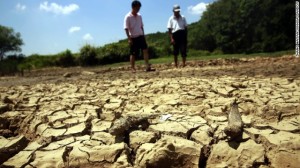
Some countries around the world have been experiencing record breaking highest temperature in the past six months.
The excessive heat has already caused deaths and harm to people, crops and animals. Heat waves also bring physiological and psychological stress to mankind. Added to this, are the physical damages caused to properties due to power outages and wildfires.
In China, deaths of more than 10 people due to heat wave have been reported last week when Shanghai experienced the hottest temperature after 140 years. In July, the southern and eastern part of the country had temperatures above 35 degrees Celsius or 95 degrees Fahrenheit.
In Japan, heat alert has been issued last week when the temperature rose to 41 degrees Celsius or 105.8 degrees Centigrade in its western, central and southern regions. More than 50 people died from heatstroke since July and the unusually high temperatures will continue for weeks according to weather authorities.
The Korea Meteorological Administration has also issued heat wave warning when one of its cities experienced the highest temperature recorded after a decade. This weather condition in South Korea has further increased the current problem in its supply of energy when some nuclear reactors have to be closed.
The unusual record breaking high temperatures were also experienced in Australia from December 2012 until the end of its summer in February 2013. This period was the hottest summer recorded in its history with the highest temperature nearing 50 degrees Celsius. Several parts of the continent were exposed to intense heat wave.
In the United States, several areas in Southern California were also struck by heat waves. It was in June 2013 when the temperature in the Death Valley, California soared to 54 degrees Celsius or 129.2 degrees Fahrenheit. This has been recorded as the highest world record for the month of June. However, a month later, the temperature in Death Valley further increased by 5 degrees.
Some tips from the Red Cross on how to respond to heat waves:
- Drink plenty of fluids even if you do not feel thirsty.
- Avoid drinks with caffeine or alcohol.
- Eat small meals and eat more often.
- Wear loose-fitting, lightweight, light-colored clothing.
- Avoid dark colors because they absorb the sun’s rays.
- Slow down, stay indoors and avoid strenuous exercise during the hottest part of the day.
- Postpone outdoor games and activities.
- Use a buddy system when working in excessive heat.
- Take frequent breaks if you must work outdoors.
For more tips: http://www.redcross.org/prepare/disaster/heat-wave






